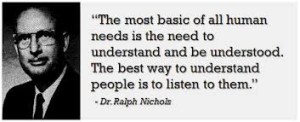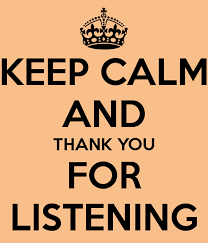
- Decide to listen! At the start of every business discussion, make the commitment to listen actively to the other person. A good listener is highly valued.
- Focus on what the speaker is saying, and don’t use that time to think of what your response will be.
- Listen with respect. Even if you don’t like the speaker, that doesn’t mean the information is not valid – often the song is more important than the singer!
- When you are not sure you have understood, say the message back to the speaker in your own words and ask if that is what was meant. This is called “reflective listening,” and it helps clarify information.
- Ask closed questions, which can be answered with one word, for confirmation. For example, “Can you see how this will benefit your business?” or “has this been helpful?”
- Ask open questions, which require more than a one-word answer, to expand the discussion. For example, “When you talk about… what did you learn from that experience?”
- Listen for feelings as well as words, often indicated by tone of voice or body language.
- Learn to distinguish fact from opinion. “It’s raining” is fact, but “The weather is horrible” is opinion. “If you pass this exam you will receive a certificate” is fact, but “You should take this exam” is opinion.
- When someone’s words are not consistent with body language and tone of voice, listen first to the non verbal cues.
- Use silence to think of your response after hearing the entire question or comment. A well thought out answer is often better than a fast one.
Source: Helen Wilkie’s “99 Tips to Improve Your On-The-Job Communication.” http://www.mhwcom.com/

Please follow and like us:
